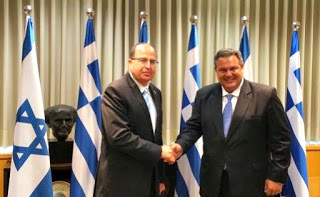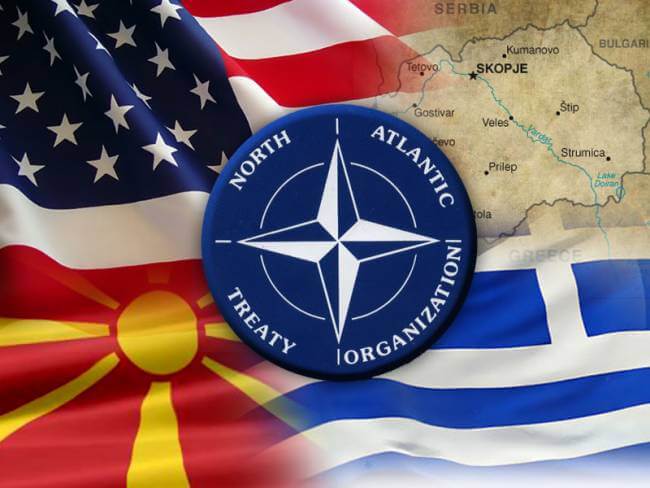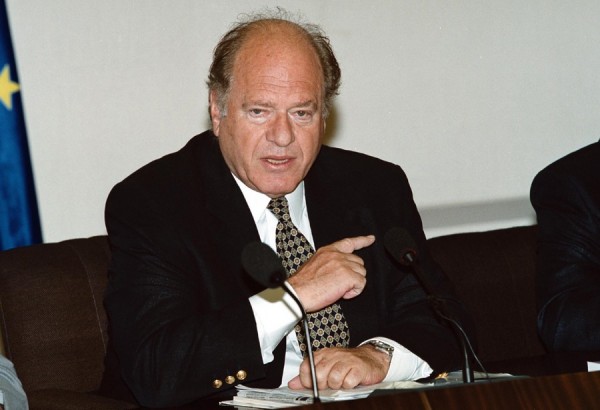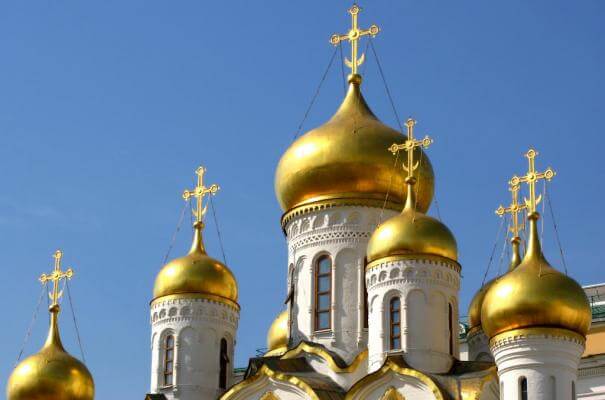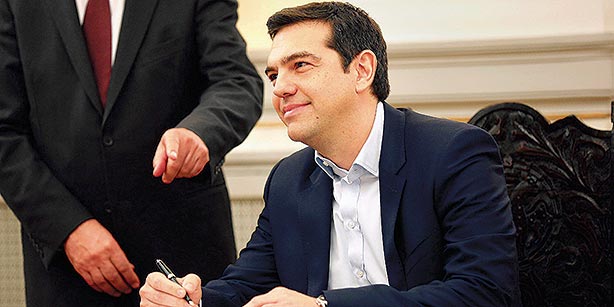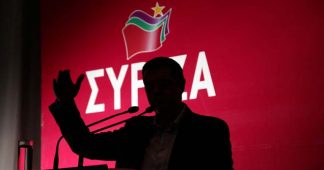Connected with the “International of Finance”, he was introduced by prominent Greek-Americans to George Papandreou and he soon acquired an enormous influence on him. He is a man who, as many believe, has played an enormous role in “directing” Athens were it finally went in the last 15 years. He shaped much of Greek foreign policy under Papandreou, he was able to “control” his entourage, but he has had also excellent relations with the Samaras government, and also with some personalities around SYRIZA. He was active in the overthrow of Yugoslav President Milosevitch, in the irruption of the War between Georgia and Russia in 2008, he was able to “open” doors normally closed to Americans in the Middle East using the historic name of Papandreou and he was involved in many other of the more obscure affairs in international relations during the last 15 years. (Before coming to Greece he also used to be director of a magazine the British SOAS was publishing on Western African Affairs.
The European Commission has appointed him special representative for the Corn of Africa, thus providing him with diplomatic immunity. He was accused nevertheless of criminal offenses in Greece and his affair is pending in Greek justice. The Russian website Katehon has published the following article on his relations with the Orthodox Patriarchate of Constantinople.
On June 20th, the so-called Pan-Orthodox Council officially opened in Crete, although it did not manage to become a genuinely Pan-Orthodox one. The event drew the attention of not only Orthodox people all over the world (largely because of the controversy shrouding the decision to convene it), but also the world’s intelligence agencies. According to the analytical center Katehon, the US and UK secret services are attempting to influence the Council’s decision, mainly by using their agents of influence in the Patriarchate of Constantinople. The purpose of this is to undermine the influence of the Russian Orthodox Church, promote the weakening of Orthodoxy by ecumenical and Renovationist trends, and advocate the granting of autocephaly to the Ukrainian Orthodox Church, thus contributing to dividing the Orthodox world.
One of the key figures behind this is Father Alexander Karloutsos, a member of the Council’s organizing committee and fundraiser of the Patriarchate of Constantinople in charge of communication with influential businesses and the US authorities. In fact, Karloutsos controls the majority of the funds that come from the United States to Constantinople, and thus controls the hierarchy.
Another important figure in charge of the relationship between the Crete Council and US intelligence is Alex Rondos who currently holds the post of the EU Special Representative for the Horn of Africa. Rondos is closely tied to the hierarchy of the Patriarchate of Constantinople, US intelligence agencies, the United Kingdom, and globalist NGO’s. He was personally acquainted with Father Alexander Karloutsos, and often visits George Soros. Alex Rondos’s biography is so intriguing that the plot reads like a spy novel.
Benefactor and Spy
Alexander Rondos is a citizen of Greece born in 1954 in the Sultanate of Zanzibar to Dar es Salaam (de facto a British colony at that time, now part of Tanzania). He studied in the UK, was a correspondent for the British magazine West Africa Magazine, and then worked for Catholic Relief Services, an American Catholic NGO. In the 1980’s, in the United States, he met with George Soros and entered the structure of the Patriarchate of Constantinople in America. This strategy was successful, and, in 1992, Rondos founded and headed, with the support of Soros, the International Orthodox Christian Charities (IOCC), the international Orthodox charitable organization under the auspices of the Patriarchate of Constantinople.
The purpose of this structure is controlling powerful financial flows under the pretext of church charity. Rondos befriended Alexander Karloutsos on the basis of interest in church money and overall relations with American “philanthropists”. Rondos used this structure to spread his influence to other Orthodox countries (Yugoslavia, Russia, Middle East). In particular, in 1998, under the guise of the IOCC, on the eve of the bombing of Yugoslavia, he visited Albania and Kosovo on a mission. After all necessary information was received and negotiations were conducted, the NATO military operation began.
Organizer of Color Revolutions
It is interesting that this “Orthodox benefactor” actively participated in organizing color revolutions when and where demanded by US interests and his old friend George Soros. In 2000, Rondos advised the organizers of the so-called Bulldozer Revolution in Yugoslavia.
After the color revolutions in Georgia, he became Mikhail Saakashvili’s adviser. According to his publication on Georgian-Russian relations in 2008, he was aware of the preparation of the Georgian invasion of South Ossetia beforehand and was preparing the Western public for this action.
Rondos also seems to have been an adviser of the first Ukrainian Maidan in 2004. With his assistance, CANVAS (Centre for Applied Nonviolent Action and Strategies) was founded in Belgrade, the headquarters of color revolutions, which perfected the techniques of the Arab Spring and 2014 Ukrainian Maidan.
Greece’s Dark Business
Rondos was also an advisor to the Prime Minister of Greece, the American born friend of Soros and the head of the Socialist Party PASOK, George Papandreou in 2009-2011 and was considered his first assistant in all international projects. Before, from 1999 to 2004, Rondos advised Papandreou when he was Minister of Foreign Affairs of Greece and the Governor of the Holy Mountain Athos. After the begging of Antonio Samaras’ return, Rondos retained his influence on the Greek government. In 2012, Rondos was questioned about his involvement in the plot against the former Prime Minister of Greece, Kostas Karamanlis. His lawyer was Failos Kranidiotis, a member of the New Democracy liberal party and a close friend of Antonio Samaras.
According to official Greek investigation, the plot, whose purpose was preventing a rapprochement between Russia and Greece, actually existed between 2004-2009.
Rondos was also involved in corruption scandals, such as when money from the Greek budget found its way to the certain NGO’s, but he avoided punishment.
But the fact that a significant proportion of the funds that Rondos’s initiative provided for NGO’s in Greece were spent on Macedonia, Albania and Kosovo, where the organization was not officially present, shows us that this was in effect a shadowy redistribution of funds within the strategy of a color revolution, as prepared in Macedonia. This was not a mere money-laundering operation. In Greece itself, left-liberal NGO’s received priority financing, thus providing external control of the country and Greek money.
A Jack-of-All-Trades
According to Greek sources, Rondos has been particularly active in Albania. In particular, he maintains close relationships with many leaders in Albania and Macedonia. It should be recalled that for the US, the Albanian factor is used to destabilize the situation in the Balkan states. The Global Plutocracy is closely tied to the Albanian drug mafia and the “black transplant” industry, which have their centers in Kosovo and Albania. Rondos actively supported the idea of granting independence to Kosovo and participated in various expert initiatives to this end.
Taking into account his “experience” in Kosovo, will Rondos be active and successful in cooperating with militants and criminal communities in Somalia in his new official position?
In addition, Alex Rondos has worked in international financial institutions, particularly the World Bank, and is a member of the European Council on Foreign Relations, the European branch of the largest American globalist center, the Council on Foreign Relations.
Wherever Alex Rondos appears, he lobbies the same interests of his American masters, promotes Soros’ initiatives, changes regimes, and bolsters unipolar American hegemony by means of network war strategy. If this broad specialist is indeed convening the Crete Council, then Orthodox people should expect the most sophisticated provocations and direct measures of intimidation.
